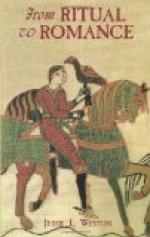In the light thrown by Professor von Schroeder’s researches, following as they do upon the illuminating studies of Mannhardt, and Frazer, we become strikingly aware of the curious vitality and persistence of certain popular customs and beliefs; and while the two last-named writers have rendered inestimable service to the study of Comparative Religion by linking the practices of Classical and Medieval times with the Folk-customs of to-day, we recognize, through von Schroeder’s work, that the root of such belief and custom is imbedded in a deeper stratum of Folk-tradition than we had hitherto realized, that it is, in fact, a heritage from the far-off past of the Aryan peoples.
For the purposes of our especial line of research Mysterium und Mimus offers much of value and interest. As noted above, the main object of these primitive Dramas was that of encouraging, we may say, ensuring, the fertility of the Earth; thus it is not surprising that more than one deals with the theme of which we are treating, the Freeing of the Waters, only that whereas, in the quotations given above, the worshippers praise Indra for his beneficent action, here Indra himself, in propria persona appears, and vaunts his feat.
“Ich schlug
den Vritra mit der Kraft des Indra!
Durch eignen Grimm
war ich so stark geworden!
Ich machte für
die Menschen frei die Wasser"[6]
And the impersonated rivers speak for themselves.
“Indra,
den Blitz im Arm, brach uns die Bahnen,
Er schlug den
Vritra, die Ströme einschloss."[7]
There is no need to insist further on the point that the task of the Grail hero is in this special respect no mere literary invention, but a heritage from the achievements of the prehistoric heroes of the Aryan race.
But the poems selected by Professor von Schroeder for discussion offer us a further, and more curious, parallel with the Grail romances.
In Section viii. of the work referred to the author discusses the story of Rishyaçriñga, as the Mahâbhârata names the hero; here we find a young Brahmin brought up by his father, Vibhândaka, in a lonely forest hermitage[8] absolutely ignorant of the outside world, and even of the very existence of beings other than his father and himself. He has never seen a woman, and does not know that such a creature exists.
A drought falls upon a neighbouring kingdom, and the inhabitants are reduced to great straits for lack of food. The King, seeking to know by what means the sufferings of his people may be relieved, learns that so long as Rishyaçriñga continues chaste so long will the drought endure. An old woman, who has a fair daughter of irregular life, undertakes the seduction of the hero. The King has a ship, or raft (both versions are given), fitted out with all possible luxury, and an apparent Hermit’s cell erected upon it. The old woman, her daughter and companions, embark; and the river carries them to a point not far from the young Brahmin’s hermitage.




